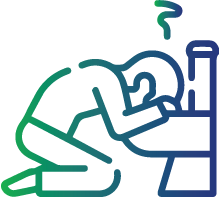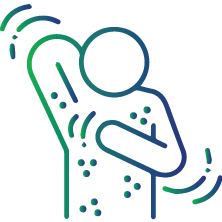
Allergy panel Test
About Allergy panel:
Allergy refers to a medical condition where your body’s immune system overreacts to foreign particles, which are otherwise harmless to other people. Substance that causes allergy are referred to as allergens.
Allergy panel involves identification of allergens such as mold, pet dander, bee stings, pollen, etc that can cause allergy. If you have an allergic reaction when you get in contact with any of these substances in your immediate environment then it indicates you are allergic to these substances. People also exhibit allergic reaction to food substances such as peanut, milk or soy etc.
Causes of allergy:
1. Genetic predisposition
2. Environmental factors – such as, dust mite droppings, animal dander, pollen grains, latex (natural rubber), diet, medications etc.
Symptoms of allergy

Headaches

Itchy, watery eyes

Sneezing

Difficulty in breathing

Swelling of body parts exposed to allergens

Stomach ache

Vomiting

Skin rash
Tests included in Allergy panel:
An allergy panel is a collection of tests that look for the most common allergens in the country. As a result, the most specific diagnosis is made, and results are provided. The tests included in the allergy panel tests are:
Allergy, non-veg Food panel:
-
This panel looks for allergies to beef, chicken, egg white, egg yolk, fish, pork, salmon, prawn, and tuna, among other things
Allergy, paediatric panel:
-
This panel screens children for allergies to almonds, aspergillus fumigatus, cat dander, cockroach-, dog dander, egg white, fish, house dust, peanut, milk, rice, and other foods
Allergy, Rhinitis/ Asthma/ Inhalant panel:
-
This panel looks for allergies to honey mesquite, acacia, aspergillus fumigatus, dog dander, elm, eucalyptus gum tree etc
Allergy, veg food panel:
-
This panel looks for allergies to egg plant, aubergine, banana, chickpea, gluten, lemon, lentil, rice, soyabean, tomato, pineapple, wheat and papaya, etc
1.
Types of allergy test:
There are various types of allergy test. Based on your symptoms you are advised one or more of the following tests:
1. Skin prick (scratch) test – A few droplets of potential allergens are dropped onto your skin and gently scratched, allowing these droplets to enter your skin. Within 10-15 minutes of exposure, reactions such as skin redness or rash may occur. This test looks for allergies to airborne particles, foods, and penicillin.
2. Intradermal skin test – This test is recommended if your skin prick test results were negative or inconclusive. Your epidermis is exposed to trace amounts of allergens (outer layer of the skin). This test looks for allergies to irritants in the air, medications, and insect stings.
3. Patch test – This test aids in the diagnosis of contact dermatitis. You may be given an allergen-containing patch (bandage). You leave the bandage on for 48-96 hours. If you notice any rash or reactions after removing the bandage, it is likely the reason to your contact dermatitis.
4. Blood test (IgE) – Your blood sample is taken, and allergens are added to it. The levels of IgE antibodies are measured after the allergens are added to the blood sample. These tests could produce false-positive results, at times.
5. Challenge test – This test is performed under the supervision of a medical professional. It entails administering a suspected allergen or drug that is suspected of causing allergy. If you have an abnormal reaction to this, an epinephrine injection is given right away to stop the reaction.
Who should get tested?

People who have Asthma

People who have had allergic reactions in the past and not got screened

People with certain skin conditions such as eczema or psoriasis

People who have pets in their house
Test preparation:
Your provider will ask you to stop taking any allergy medications 3 – 7 days before taking the test. Allergy medications stops immune responses to allergens and interferes with accurate test results. However, if you are an Asthma patient, you should continue taking asthma medication
Interpretation of the results:
Positive test result
If you have a positive test result to allergy panel, it means you are allergic to that particular allergen. Even if you are allergic to certain allergens it is not always necessary that you will have a reaction to those. Sometimes the results may also show false positive, especially from a blood test. A false-positive result indicates you have allergy to certain allergen though you don’t.
Negative test result
If you have a negative test result to allergy panel, it means you are not allergic to that particular allergen.
FAQs
Why do children require allergy panel testing?
Allergy panel testing in children can help you determine which substances are causing allergy symptoms in your child. Knowing the cause of allergy symptoms aids in proper diagnosis and lowering the likelihood of future exposures to the same substance that caused allergy symptoms in the past
Are children exposed to any risks as a result of the allergy panel test?
No, there are no absolute risks to children from allergy panel testing. However, a minor sting or bruise will be felt at the site of the needle puncture for sample collection
What are the different types of allergies one may experience?
Different types of allergies that one may experience include:
· Food allergy – due to certain food substances such as peanut, milk, and soy, etc
· Skin allergy – due to contact with certain allergens such as pollen.
· Dust allergy – Due to contact with dust mites etc
· Insect allergy – Due to insect stings such as bees, wasps etc
· Drug allergy – due to certain medication such as penicillin.
What is an anaphylaxis reaction?
Anaphylaxis reaction is a serious, life-threatening reaction of the body’s immune system that may occur with in few seconds of exposure to some allergens. A few symptoms to anaphylaxis reaction include sudden dropping of blood pressure, narrowing of airways, blocking breathing etc. These reactions need immediate treatment and does not resolve on its own.
How long does an allergy panel test results take?
Allergy panel is done at laboratory where in you are subjected to few allergens based on your symptoms and results are interpreted. It usually takes about 30 to 40 minutes. However, a few tests such as patch test will take few days to get the results
I have a known allergy to latex, and I was exposed to it during the test. Will it be dangerous for me?
Allergy panel is always recommended in the presence of professional healthcare provider. If any reactions are detected during testing, you will be given an antihistamine to help you overcome the effects of the allergens. In general, epinephrine is administered in severe allergic reactions
What are the benefits of allergy testing?
People all over the world suffer from allergies. These allergy tests may help reduce symptoms that range from minor discomfort to severe disability. The information from these allergy tests may help your healthcare provider to develop an efficient and accurate allergy treatment plan that help minimize the effects of allergy
Related tests
Blood Group ABO and Rh Typing
₹ 170-
Includes
1 Test Parameter(s)
-
Blood Group ABO and Rh Typing test help identify your blood group from four major blood types: Type A, Type B, Type AB, and Type O. This test also determines if a person has a substance called Rh factor on the surface of the red blood cells. If an individual has Rh factor on the surface of RBC, the blood is Rh positive; if Rh factor is absent, the blood is Rh negative. This test is done when the blood or blood components transfusion is required, blood or organ donation, tissue or bone marrow transplantation, or to determine the risk of Rh incompatibility with the fetus in a pregnant woman.
Blood Glucose Post prandial (PPBS)
₹ 90-
Includes
1 Test Parameter(s)
-
Post-prandial blood glucose is a common test used to measure the level of PP blood sugar present after two hours of a meal. In patients with diabetes, there may be abnormal spikes of blood glucose level after meals; The postprandial blood sugar test indicates how the body responds to the intake of sugar and carbohydrates after a meal and is indicated for monitoring people with pre-diabetes, type-1, and type-2 diabetes
Blood Glucose Fasting (FBS)
₹ 85-
Includes
1 Test Parameter(s)
-
Blood Glucose Fasting, also known as the Fasting Blood Plasma Glucose (FPG) test, measures fasting blood glucose level. Fasting means one should not eat or drink (anything except water) for 8 hours before taking the blood sample. This plasma glucose test helps determine if the body can utilize or store glucose efficiently. FBS plasma test is one of the tests done to evaluate diabetes mellitus and monitor treatment efficacy in patients undergoing diabetes treatment. It also helps to detect diabetes during pregnancy or gestational diabetes.
Blood Culture bottle 1 and 2 ( Aerobic & anaerobic)- VITEK
₹ 1,500-
Includes
1 Test Parameter(s)
Histopathology- Skin Biopsy LM & IF
₹ 1,380-
Includes
1 Test Parameter(s)
-
Histopathological examination of skin biopsy is a gold-standard diagnostic tool in cases of abnormal or inflammatory skin lesions. Light microscopy (LM) is a technique used to view living or dead specimens using different types of stains. This test is used for types of stain: Gram stain, haematoxylin and eosin (H&E) stain, and Giemsa stain. It is used to diagnose skin diseases, like skin cancer, infections, and conditions that cause blisters and rashes. A skin biopsy may also be useful to confirm the type of cancer (e.g., basal cell carcinoma, squamous cell carcinoma, melanoma) before a surgical procedure.
Tests At Lupin Diagnostics
Complete Blood Count (CBC)
₹ 280-
Includes
1 Test Parameter(s)
-
Complete blood count (CBC) is a type of blood test that helps determine an individual's overall health. This test evaluates red blood cells that carry oxygen from the lungs to the rest of the body and white blood cells , which fight infections and other diseases. There are five major types of white blood cells, and the CBC test measures the total number of white cells in the blood.CBC test includes an absolute and differential count of basophil, eosinophil, lymphocyte, monocyte, and neutrophil that measures the levels of these cells in the blood. CBC also measures the levels of platelets, which help prevent and stop bleeding. Hemoglobin is a protein in red blood cells, and the Mean corpuscular hemoglobin (MCH) test measures the average amount of hemoglobin in each red blood cell, mean corpuscular hemoglobin concentration (MCHC) test determines the average concentration of hemoglobin in a single red blood cell (RBC). Hematocrit/ Packed Cell Volume (PCV) measures the proportion of red blood cells, and red cell distribution width (RDW) evaluates the differences in the volume and size of your red blood cells. Mean corpuscular volume (MCV) measures the average size of the red blood cells. Complete blood counts can help detect various disorders, including infections, anemia, and diseases affecting blood components.
Allergy, Veg Food Panel
₹ 5,500-
Includes
1 Test Parameter(s)
-
The Allergy Veg Food Panel test is used to identify veg foods causing an allergic reaction. This test helps doctors advise which food should be avoided to prevent allergies. Skin prick testing/puncture/scratch test is an potential method to identify whether the individual is allergic to specific foods such as aubergine, eggplant (Brinjal), banana, chickpea, gluten, lemon, lentil, milk, orange, papaya, peanut, pineapple, rice, soybean, tomato, and wheat.
Allergy Screen-Infants (<5 years)/Phadiatop children
₹ 950-
Includes
1 Test Parameter(s)
Allergy, Dust Panel
₹ 2,800-
Includes
1 Test Parameter(s)
-
An allergy dust panel test is used to diagnose if a person is allergic to cockroach american, allergy, dermatophagoides farinae, allergy, dermatophagoides pteronyssinus, allergy house dust (greer labs Inc), allergy house dust (Hollister-Stier). This test helps make certain lifestyle modifications and preventive measures to minimize allergic reactions.

